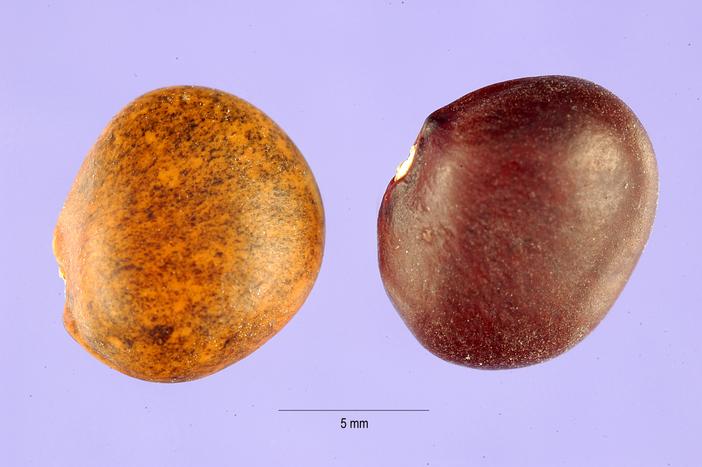Spotted Bean
(Phaseolus maculatus)
Spotted Bean (Phaseolus maculatus)
/
/

Tracey Slotta
Public domain
Image By:
Tracey Slotta
Recorded By:
Copyright:
Public domain
Copyright Notice:
Photo by: Tracey Slotta | License Type: Public domain | License URL: https://creativecommons.org/public-domain/ | Uploader: Jacopo Werther | Publisher: Wikipedia Commons

















Estimated Native Range
Summary
Phaseolus maculatus, commonly known as Spotted Bean, is a deciduous perennial vine or herb. It is native to a range of habitats including open woodlands, forest edges, and chaparral in the Southwestern United States and Northwest Mexico. This plant is characterized by its trailing habit and a large, woody taproot, which allows it to survive in arid conditions. The leaves are trifoliate, meaning they are composed of three oval leaflets, each up to 8 cm (3.2 in) long, with small uncinate (hooked) hairs that help in water conservation. The leaf blades are oriented vertically, which minimizes sun exposure and reduces water loss. Phaseolus maculatus blooms with purple flowers that are modest in size but can be quite attractive when viewed up close. The seeds are distinctively mottled with black and brown, adding to the plant’s ornamental value.
In cultivation, the Spotted Bean is valued for its drought tolerance and its ability to adapt to various soil conditions, although it prefers soils with medium drainage. It is suitable for xeriscaping, wildlife gardens, and as a ground cover in areas with dry climates. While it thrives in full sun or part shade, it requires medium amounts of water, especially during prolonged dry periods. Gardeners should be aware that, like many beans, it may be susceptible to pests such as bean beetles. However, its resilience and low maintenance make it a good choice for gardeners looking to add a touch of the Southwest to their landscapes.CC BY-SA 4.0
In cultivation, the Spotted Bean is valued for its drought tolerance and its ability to adapt to various soil conditions, although it prefers soils with medium drainage. It is suitable for xeriscaping, wildlife gardens, and as a ground cover in areas with dry climates. While it thrives in full sun or part shade, it requires medium amounts of water, especially during prolonged dry periods. Gardeners should be aware that, like many beans, it may be susceptible to pests such as bean beetles. However, its resilience and low maintenance make it a good choice for gardeners looking to add a touch of the Southwest to their landscapes.CC BY-SA 4.0
Plant Description
- Plant Type: Vine, Herb
- Height: 3-8 feet
- Width: 3-8 feet
- Growth Rate: Moderate
- Flower Color: Purple
- Flowering Season: Summer
- Leaf Retention: Deciduous
Growth Requirements
- Sun: Full Sun, Part Shade
- Water: Medium
- Drainage: Medium
Common Uses
Butterfly Garden, Edible*Disclaimer: Easyscape's listed plant edibility is for informational use. Always verify the safety and proper identification of any plant before consumption., Low Maintenance, Potted Plant
Natural Habitat
Native to open woodlands, forest edges, and chaparral in the Southwestern United States and Northwest Mexico
Other Names
Common Names: Metcalfe Bean, Prairie Bean, Metcalf Bean, Cocolmeca Bean
Scientific Names: , Phaseolus maculatus, Phaseolus maculatus var. maculatus,
GBIF Accepted Name: Phaseolus maculatus Scheele